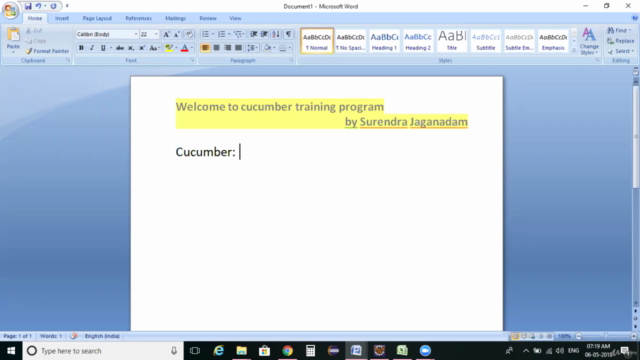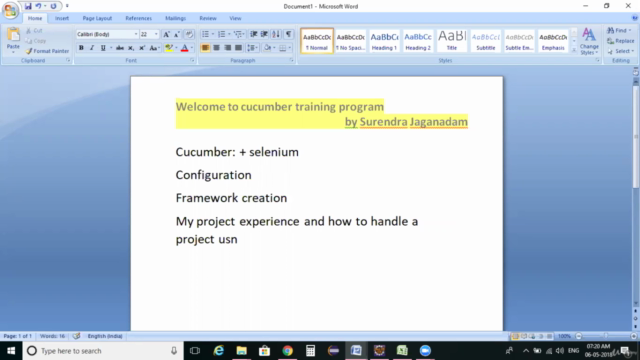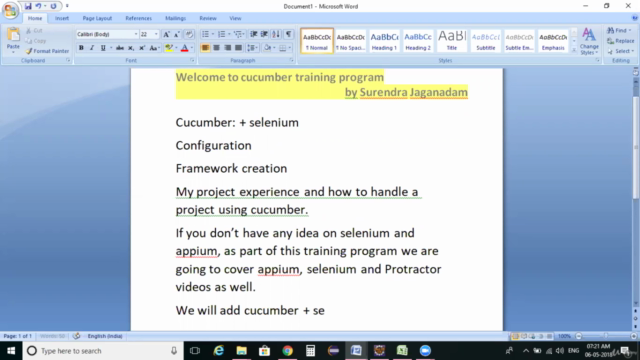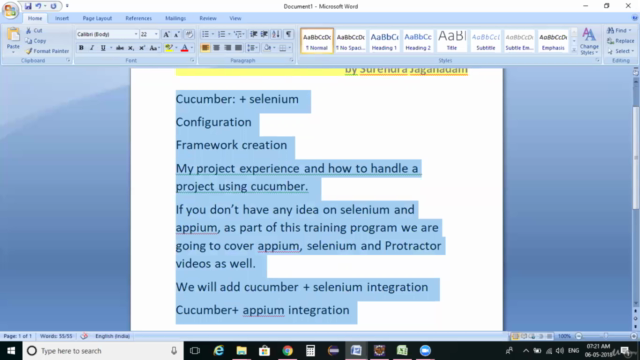CUCUMBER -BDD Framework for Selenium , Protractor and Appium

Why take this course?
Based on the outline provided, it seems you're looking to cover a comprehensive range of topics related to mobile and web automation using tools like Appium, SauceLabs, Jenkins for CI/CD, Protractor for AngularJS applications, and various testing practices such as Page Object Model. Here's a brief overview of each chapter and topic based on your outline:
Chapter 1: Introduction to Mobile Automation
- Overview of mobile automation and its importance.
- Introduction to Appium as a tool for automating mobile applications.
Chapter 2: Setting up Environment for iOS/Android Apps Automation
- Installing and setting up Eclipse IDE, JDK, Appium, and required tools.
- Configuring the environment for both iOS and Android app testing.
Chapter 3: Appium Fundamentals
- Understanding the architecture of Appium.
- Setting up Appium on local machine using Appium Desktop or command line.
Chapter 4: Working with Real Devices and Emulators/Simulators
- Connecting real devices for testing.
- Using emulators/simulators for app testing.
Chapter 5: Writing and Executing First Test Script in Appium
- Creating a simple test case using Appium with different commands.
Chapter 6: Advanced Appium Features
- Exploring advanced features like hybrid applications, multiple platforms, etc.
Chapter 7: Integrating CI/CD Pipeline with Jenkins and Appium
- Setting up a continuous integration and deployment pipeline using Jenkins.
- Automating the testing process within the CI/CD pipeline.
Chapter 8: Exploring SauceLabs for Cross-Browser Testing
- Introduction to SauceLabs and its integration with Appium.
- Running tests across different browsers and platforms using SauceLabs.
Chapter 9: Protractor Content/Protractor on a real project
- Overview of Protractor and its role in end-to-end testing for AngularJS applications.
- Setting up Protractor environment and understanding its architecture.
Chapter 10: Protractor Installation and Configuration
- Detailed steps to install Protractor and configure it for an AngularJS application.
Chapter 11: Jasmine Framework and Protractor
- Introduction to the Jasmine testing framework used with Protractor.
- Writing test cases using Jasmine's
describeanditfunctions.
Chapter 12: Page Object Model (POM) for Protractor
- Understanding POM and its benefits in test maintenance.
- Refactoring spec scripts into page objects.
Chapter 13: Protractor with Java
- Setting up Protractor to work with Java.
- Writing test scripts using Java, utilizing the JProtractor library.
Throughout these chapters, you'll learn not only how to write and execute test scripts but also how to integrate your testing framework into a larger development process, ensuring that tests are run automatically as part of the build process. You'll also explore best practices for structuring your tests using the Page Object Model, which can help maintain cleaner and more modular test code.
By the end of this comprehensive guide, you should have a solid understanding of mobile and web automation, be able to write effective test cases, and understand how to integrate these tests into a CI/CD pipeline for continuous testing and delivery.
Course Gallery




Loading charts...